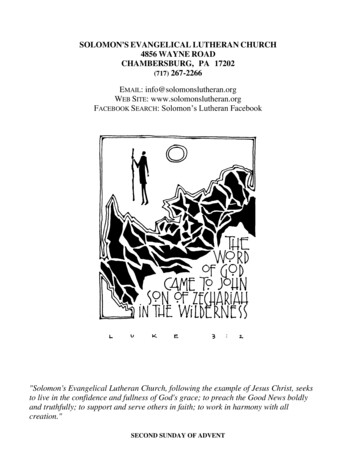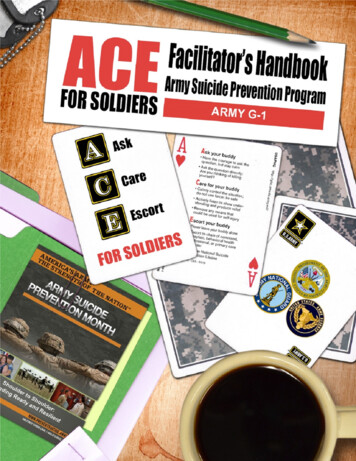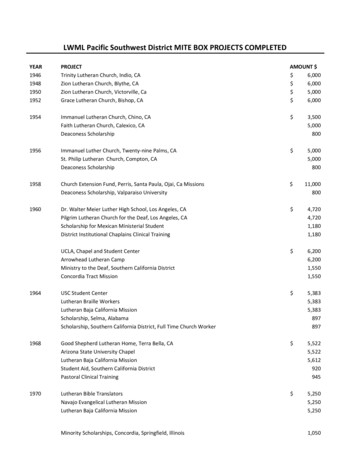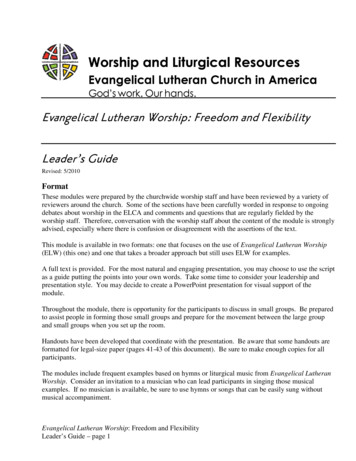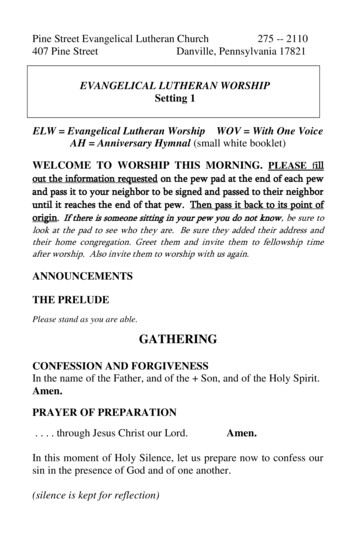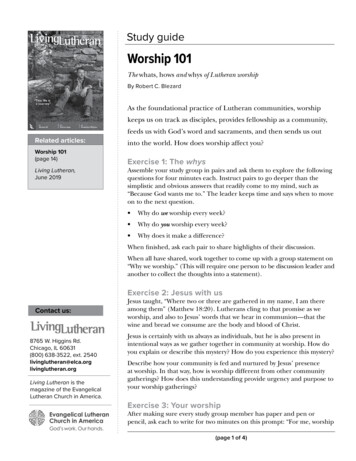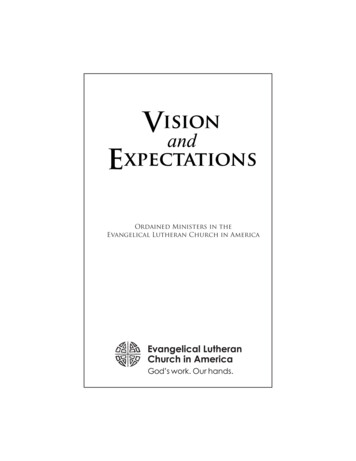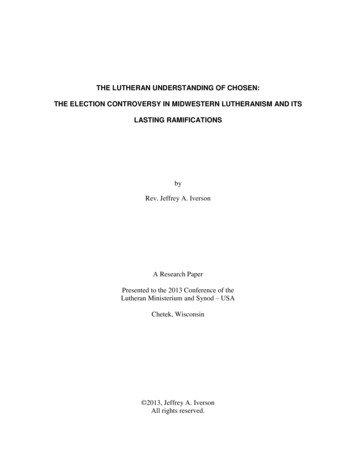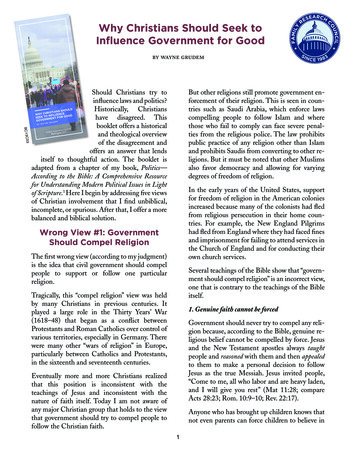
Transcription
Christians Can Be Soldiers
Dedicated to my fellow soldiersat the10th Combat Aviation BrigadeFt. Drum, NYFly to Glory
Christians Can Be SoldiersFROM MARTIN LUTHER’SWHETHER SOLDIERS TOO CAN BEIN A HOLY ESTATETranslated byHolger SonntagEdited and Arranged byPaul Strawn
Funding for this project provided by:The Confessional Lutheran Education Foundation (The CLEF)PO Box 43844Minneapolis, MN 55443-0844TheCLEF@TheCLEF.org & www.TheCLEF.orgAll International translation rights are the property of The CLEF.Lutheran Press, Minneapolis 55432 2010 by Lutheran PressAll rights reserved.Printed in the United States of America.1st EditionISBN 978-0-9748529-8-0Library of Congress Control Number: 2010920748Swan logo is a LifeART image 2010 Lippincott Williams &Wilkins. All rights reserved.Book design by Scott Krieger.
Table of ContentsForeword71 Introduction112 What Does War Prevent?173 Aren’t Present-Day Wars Different?234 How Can the Sword be Administered Justly?295Is Rebellion Ever Justified?356 The Sin of Authorities is Not Corrected by Sin437 Changing Authorities Differs from Improving Them498 Subjects Should Not Rebel Against Authorities579 Can Equals War Against Each Other?6310 A War is More than Simply Words7111 Just Cause Does Not Guarantee Victory7512 May an Authority Wage War Against Those Under It?8113 May a Soldier Justly Earn a Salary and Benefits?8514 What About a Soldier’s Honor in an Unjust War?8915 How Does a Christian Soldier Prepare for Battle?93Afterword99
ForewordAs the text that follows was being prepared for publication in the Winter of 2009, the armed forces of theUnited States were still engaged in conflict in both Iraqand Afghanistan, but also, for the first time in years, weremeeting all recruitment goals. Families of those servicemen and women—and in many cases the companies andcorporations for which they worked—were actively participating in all sorts of activities in support of their service.With the beginning of a new presidential administration,however, what the future holds for these conflicts, thoseserving within them, and their families at home, is anyone’sguess.Added to the mix of this reality are three movies from2008 dealing with crucial aspects of military action remaining in wide release. The first, Valkyrie, a retelling of the plotby German officers to assassinate Hitler, raises the questionas to whether or not a tyrant is to be tolerated, and if not,whose responsibility it is to depose him. The second, TheReader, a fictional account of the life of a former concentration camp guard in post-World War II Germany, raisesthe question of the responsibility of individual soldiers foractions taken while in military service. A third movie, Defiance, relates the true story of Jewish resistance fighters inNazi-occupied Belarussian forests, and raises the questionsForeword
that come with armed resistance to an established authority. While all three movies deal specifically with Germanactions during World War II, they address questions ofuniversal significance which in one way or another haveconfronted all Christians who have taken up arms for onereason or another.Without a doubt the chief question posed is the moralityof a given action by an individual in the midst of armedconflict. Specifically: How can a Christian know that whatis being done is right or good in the eyes of God? If thatChristian is serving in the military, does moral obligationcease to be an issue? If military service results in a chronically trouble conscience, can it ever be quieted?This book offers answers to these questions. It describeschiefly how a Christian can indeed serve in the military,and serve in the military in the most dangerous and deadlyof positions, with a clear conscience. It also addresses therole of armed conflict in general in Christian life. It ishoped that by offering this classic work in a new and freshtranslation, it will provide comfort not only to Christianmen and women serving in the military, but also to theChristian-on-the-street who himself is troubled by thesequestions.Of course, the original work translated here (cf. Dr.Martin Luther’s Sämmtliche Schriften, ed. by J. G. Walch(St. Louis: Concordia Publishing House: 1885) Vol. 10 C.,Cols. 488-531) did not have chapters or study questions.These have been added to ease reading, study and reference.The greater historical and current theological context istreated in the extensive Afterword. Special thanks are due Christians Can Be Soldiers
to The Confessional Lutheran Education Foundation fortheir funding of this project. Responsibility for any shortfalland weakness within the text is mine alone.Paul StrawnForeword
1IntroductionThere are Christians who are troubled by the military andwhat it does. Some go so far as to doubt whether it shouldeven exist. Other Christians serve in the military but doso only by ignoring the questions it raises about God, thehuman conscience, and the soul.Why would a Christian ignore such critical questions?The logic is simple: If a Christian serving in the militaryactually thought about God, listened to his conscience, andfeared for his soul, he would not serve.But can anyone be a soldier without thinking about suchthings? Shouldn’t God and the soul be just the things thatIntroduction11
are thought of at the most critical moments of life?In reality, a soldier can only fight to the best of his abilities if he fights with a good, well-trained conscience. Wherethere is a good conscience there is courage. Where there iscourage, the body is more powerful, the mind is more alert,and circumstances and events work together for victory(which nonetheless is granted by God!).If, however, the conscience is untrained and uncertain,courage cannot exist. It is impossible for a person with a badconscience to be anything but frightened and cowardly.Moses put it to the children of Israel in Deuteronomy28:25 this way: “If you are disobedient, the Lord will giveyou a fearful heart, so that when you go out against yourenemies one way, you will flee seven ways.”What happens when an attack is disorganized? Soldiersmove hesitantly and timidly, and victory is not achieved.As for those consciences in a company of soldiers that arewild and evil, who are known to be foolish and reckless, success or failure for them is purely a matter of chance. Whathappens to them is the same thing that would happen toan animal that might find itself in the middle of a battle.Victory is not achieved because of such soldiers. Theyare found in many companies, but are certainly never theircore.What follows is a bit of adviceThis advice is forfor those who want to be goodChristians who want soldiers, but not good soldiersto be good soldiers. alone. This advice is for Christianswho want to be good soldiers insuch a way that they do not lose God’s grace and eternal12Christians Can Be Soldiers
life.Toward this end it must be noted from the outset thatthe job a person does and who a person is are two differentthings. A specific job itself may be good and right. That job,however, can become evil and wrong if the person doing itis not good or right or does not do the job correctly.The work a judge does, for example, is highly valuable andgodly—even if the work of the executioner is consideredto be part of it. But if someone does the work of the judgewho does not have the authority to do so, or if a judge iscorrupt, then his work is no longer right nor good.Marriage is also highly valuable and godly. That still doesnot prevent many married people from behaving terriblyand horribly.The same holds true for soldiers. The work of a soldieris in and of itself right and godly. Care needs to be taken,however, that the person serving as a soldier is also righteous.By the term righteous I do not mean the righteousnesswhich makes a person right beforeGod. Such righteousness occurs The work of a soldieronly by faith in Jesus Christ, givenis in and of itselffreely without any work or meritright and godly.on our part. It is only by God’sgrace.Rather, the term righteous here refers to an external righteousness that has to do with jobs and work. The questionthis book addresses is whether or not the righteousnessbefore God that is a Christian’s by faith remains with asoldier who does what a soldier is to do: Go to war, kill,Introduction13
damage and destroy. After all, is not the work of a soldiersin and injustice? Doesn’t it burden the conscience beforeGod? Shouldn’t a Christian avoid military service? Doonly good? Love? Injure and kill no one? (Remember: Bywork what is meant is something which, although goodand right in and of itself, can nonetheless become evil andwrong when a person is evil and unrighteous.)Here I will not deal in detail with the purpose and workof war. War is in itself right and godly. What the Word ofGod calls “the sword” (Romans 13:1 ff. and 1 Peter 3:14ff.) was instituted by God to punish the wicked, protectthe innocent, and maintain peace. These passages alone arepowerful enough proof to demonstrate that waging war,killing, and whatever the course of war might take, havebeen established by God.What is war other than the punishing of injustice andevil? Why is war waged unless peace and obedience aredesired?Even if killing and destroying do not seem like works oflove, they are in reality nothing else. Uninstructed Christians think otherwise. They think that Christians shouldnever do such things.But consider the workof an excellent surgeon.Even if killing anddestroying do not seem like When infection is severe,he must remove or renderworks of love, they are in useless a hand, foot, eye orreality nothing else.ear to save the entire body.If the destroyed body partalone is considered, the surgeon certainly seems cruel and14Christians Can Be Soldiers
merciless. When the saved body is considered, however, itis clear that the surgeon is in reality an excellent, faithfulperson doing a good Christian work.Similar thoughts can also be applied to war. If the punishing of the wicked, killing of the unjust and the creationof calamity alone are considered, war appears to be a totallyunchristian work and against Christian love in every way.Yet when I consider how war protects the pious, how itpreserves and guards spouse and child, home and business,goods, honor, and peace, war turns out to be a precious andgodly work. In other words, war too cuts off a leg or handso that the entire body is not destroyed.1. Does the existence of the military trouble some Christians?2. What questions for the Christian should serving in themilitary raise?3. How can a soldier fight to the best of his abilities?4. Who grants victory in war?5. Is the job a person does and who a person is the samething?6. Is the work of a soldier righteous and godly? How so?7. What does the Word of God call ‘the sword’?8. How is the work of war like the work of a doctor?Introduction15
2What Does War Prevent?If the sword did not support and maintain peace everything in the world would be destroyed by conflict. This iswhy war is nothing other than a short period of conflictpreventing endless conflict. War is a smaller misfortunepreventing a bigger misfortune.The frequently made assertion that “war is a massiveplague” is certainly true. What is also true, however, ishow much more massive the plague is that is preventedby war.To be sure, if people were pious and gladly kept the peace,war would be the greatest plague on earth. Yet what canWhat Does War Prevent?17
be done about the fact that the world is evil? That peopledo not want to keep the peace? That people plunder, steal,kill, rape women and children, and destroy honor and possessions?Such tremendous strife, common throughout the entireworld, which no one can endure, must be counteracted bythe little strife called war or the sword. This is why Godhonors the sword so highly that he calls it his own order.God does not want us to say or think that humans inventedor established it.Because of this, the hand that uses this sword and killsis no longer man’s hand,In such a case, it is not man, but God’s hand. In suchbut God who hangs, tortures, a case, it is not man,but God, who hangs,beheads, slays, and wars.tortures, beheads, slays,and wars. All these are his works and judgments.In summary, when it comes to war, one must not look athow it kills, burns, destroys and seizes. This is what narrow,simple children’s eyes see. When it comes to a surgeon, sucheyes look no further than the amputated hand or leg. Sucheyes do not see that the point of the surgeon’s actions is tosave the entire body.The work of war or the sword must be seen with the eyesof an adult. Such eyes must perceive the reason why it slaysand acts so gruesomely.When this is done, it will turn out that war is a workthat is in itself godly. War is as necessary and useful for thisworld as eating and drinking or any other work.That is not to say that war is never abused. War is clearly18Christians Can Be Soldiers
abused whenever killing and injuring take place out of malice and not out of need. But this is the fault of the personwaging the war, not war itself.Then again, when has there ever been a job or work oranything so good that it has not been abused by maliciousand evil people? Such people are like the deranged surgeonswho amputate a person’s healthy hand out of malice, notbecause there is a need to do so.Such people belong to all those who cause strife ingeneral. Such strife must be resisted and peace enforcedby legitimate war and sword.It has always been the case, and still remains true, thatwhoever starts a war unnecessarily is defeated. Such a person cannot escape God’s judgment, that is, God’s sword.In the end God finds and destroys him.To confirm that this is true we need only to turn to thegreatest preacher and teacher next to Christ, namely, Johnthe Baptist. In Luke 3:14, soldiers came to John and askedhim what they should do. He did not condemn their work.He also did not tell them to stop being soldiers.Instead, John the Baptist approved of their work saying“Be content with your wages and do not do violence andinjustice to anyone.” By doing so, John praised the work ofwar. At the same time, however, he prohibited and forbidits abuse.The abuse of work and workitself are two different things. So The abuse of work andChrist, standing before Pilate,work itself are twoconfessed similarly that wagingdifferent things.war is not unjust. What did heWhat Does War Prevent?19
say? “If I were the king of this world, my servants wouldfight that I might not be handed over to the Jews” ( John18:36). Here also belong all the ancient war accounts inthe Old Testament, such as Abraham, Moses, Joshua, theJudges, Samuel, David, and all the kings of the people ofIsrael.Yet if waging war or the work of war is in itself unjustor displeasing to God, then we would need to condemnAbraham, Moses, Joshua, David, and all the other holyfathers, kings, and princes who served God in this way aswell and who on account of this work are praised highlyin Scripture. This is well known even to all who have readonly a little of the Bible.1. What would happen if the sword did not protect andmaintain the peace?2. What is the cause of war?3. Whose hand is it that acts in war?4. Must the work of war be seen with the eyes of a child oran adult?5. Is war ever abused?6. Is the abuse of war the fault of war, or the person waging war?7. Did John the Baptist rebuke the Roman soldiers for being soldiers?8. What happens to the person who starts a war?20Christians Can Be Soldiers
9. Who would need to be condemned if war is in itselfunjust?What Does War Prevent?21
3Aren’t Present-Day Wars Different?Now some might suggest that present-day wars aredifferent than those found in the Old Testament. At thattime, the children of Israel had been chosen by God andset apart from other nations by his word.God himself commanded the children of Israel to fight.The children of Israel therefore fought out of godly obedience to his command.For a New Testament Christian this is hard to understand. We do not have the command of God to fight. Instead, we are commanded to suffer and lose everything.Peter and Paul wrote clearly about this subject. BothAren’t Present-Day Wars Different?23
command the New Testament Christian to obey humanorder and the commands of worldly authority.John the Baptist, as noted above, taught soldiers trueChristian doctrine, and still allowed them to remain soldiers. John’s only demand: Solders should not abuse theirposition. They should do no one injustice or violence. Theyshould be content with their wages.Clearly then the waging of war is confirmed by God’sword and command in the New Testament as well. Thosewho use war rightly and fight obediently are obedient tohis word and serve God by doing so.If war is inherently unjust, however, then any such useof physical harm wouldIf war is inherently unjust, also be inherently unhowever, then any such use just. If the use of physicalharm in war is unjust, itof physical harm would also would also be unjust as abe inherently unjust.punishment for evil andfor preserving peace. Inother words, all physical harm would be unjust. But whatis waging war rightly other than punishing wrongdoersand preserving the peace?The punishment of a thief, murderer or adulterer is a punishment for an individual doer of evil. The rightly-wagedwar, however, punishes collectively multiple wrongdoers,who have done as much damage as their number allows.If one use of the sword is good and right, than all suchuses are good and right. According to Romans 13:4, whatis being used is not a feather duster, but a sword, which isnone other than the wrath of God.24Christians Can Be Soldiers
Elsewhere I have responded extensively to the argumentthat Christians have no command to fight, but instead,have Christ’s teaching that they should not resist evil butsuffer everything. Christians, of course, have no authorityto fight on the basis of their Christianity.Christians as Christians have no worldly authority.Their government is by natureChristians asspiritual. As far as their spiritsChristians have noare concerned, Christians areworldly authority.subject to no one but Christ.Yet the bodies and goods ofChristians are indeed subject to worldly authority and oweit obedience. When Christians are called into the militaryby worldly authority, they should and must fight out ofobedience. Not as Christians, mind you, but as those withinthe world, citizens, obedient people as far as their body andtemporal goods are concerned.When Christians serve as soldiers in war, they do not doso for themselves. They do not do so for their own sakes, butto serve and obey the authorities under whom they are.Paul puts it to Titus this way (3:1): “They are to be obedient to the authorities.” More about this topic can be foundin my booklet on worldly authority. In short we can simply state: The work of the sword is initself a right, godly and useful work. God does not want itto be despised, but feared, and honored and obeyed. If not,punishment will follow, as Paul says in Romans 13:5. Cf. Temporal Authority: To What Extent It Should Be Obeyed (1523), inLuther’s Works, American Edition, Vol. 45 (Philadelphia: Muhlenberg Press,1962), p. 81 ff.Aren’t Present-Day Wars Different?25
God has, after all, established two kinds of governmenton earth. One is spiritual. It acts through the word withoutthe sword. By means of this kingdom men are made piousand righteous with a righteousness by which eternal life isattained. Such righteousness God administers through theword which he has commanded preachers to proclaim.The other type of government within the world is thatof the sword. Those who have no desire to become piousand righteous unto eternal life are forced by this government at a minimum to be pious and righteous before theworld. Such a righteousness God administers through thesword.Although God does not reward such righteousnesswith eternal life, he nonetheless wants it to be established.Why? So peace among men can be preserved.God rewards this peace with wealth. This is why Godgives authorities so much wealth, honor, and power. Owning them rightly above others, authorities thereby serveGod in the administration of worldly righteousness.God himself is the Author, Lord, Master, Promoter,and Benefactor of both kinds of righteousness, of the spiritual and of the bodily. It is not a matter of human order orpower. It is all an entirely divine matter.1. Who commanded the children of Israel to wage war inthe Old Testament?2. Do New Testament Christians have that same command?26Christians Can Be Soldiers
3. Are Christians to obey worldly authority?4. If the use of physical harm in war would be unjust, whatelse would be unjust?5. Do Christians wage war on the basis of their Christianity?6. How many kinds of government are there on earth?7. What are they?8. With what does God reward peace?Aren’t Present-Day Wars Different?27
4How Can the Sword beAdministered Justly?Of utmost importance is to understand who and howone should administer the sword. The common tendencyis to establish all sorts of rules, and regulations. So manyexceptions arise, however, that it is impossible to comprehend everything precisely and without bias.This is also the case in the practice of law. Laws cannever be established so certainly and fairly that there arenot cases demanding exceptions. When such exceptionsare not granted, and laws are followed to the letter, thegreatest injustice results.The pagan Terence noted that “The strictest applicationHow Can the Sword be Administered Justly?29
of the law is the greatest injustice.” Solomon, in Ecclesiastes(7:16) teaches that one should not be overly just, and attimes, not wish to be wise.A good example of this occurred during last year’s insurrection of the peasants. Several of the rebels, especially thosewho themselves werewealthy, participated onlyLaws can never beestablished so certainly and grudgingly.Since the rebellion wasfairly that there are not casesaimed at the rich anddemanding exceptions.powerful, it was assumedthat no wealthy personwould take part. Nonetheless, several were forced againsttheir will to participate.Several others got involved by thinking they could somehow control the mad rabble. Good advice, it was thought,would hinder evil intentions and do less damage both tothe authorities and to the ones offering the advice. Stillothers participated only after receiving permission fromtheir superiors.There were certainly many more such exceptions. No onecan imagine them all or comprehend them by law.But what does the law say? All rebels are guilty of death.These three groups found themselves caught up in therebellion. What should happen to them?Should there be no exception? Should the law be strictlyapplied as it reads concerning the external act of rebellion?Even though they had an innocent heart and good willtoward the authorities? If so, they must die along withthose who, along with participating in the external act, did30Christians Can Be Soldiers
so with guilty hearts and wills.And that is what happened. Several of the minor authorities, when they realized they could enrich themselves withthe possessions of the unwilling wealthy rebels, applied thelaw in just such a way.All they did was say to them: You were among the rabble.You must die.In just such a way a great injustice was done to manypeople. Innocent blood was shed. Widows and orphanswere created. Goods were stolen.In such cases the law should give way to equity. The lawflatly states: “Rebellion is guilty of death. It is a sin againstauthority.” Equity, however, replies:In such cases the“That is true. But it just can be thatlaw should givetwo people who do the same thingway to equity.externally do so with differenthearts and minds.”Judas kissed the Lord Christ in the garden (Matthew26:49). That is a good work externally which was normallypracticed good-heartedly among the disciples. Judas’ heart,however, was evil and betrayed its Lord. Peter, on the otherhand, stood next to the servant of Annas at the fire, warming himself with the godless (Luke 22:55), which was notgood.If the law would be strictly applied, Judas would be considered pious and Peter a scoundrel. Judas’ heart, however,was evil, and Peter’s was good.This is why equity in this case must be superior to thelaw. Equity, therefore, acquits those among the rebels whoacted in good faith. It also deems them doubly worthy ofHow Can the Sword be Administered Justly?31
mercy.They are just like pious Hushai the Archite (2 Samuel15:32 ff. and 16:16 ff.). Hushai submitted to the rebelAbsalom, pretending to be obedient. But David had commanded him to do so, in order that David might be helpedin thwarting Absalom.Viewed externally, Hushai was rebellious along withAbsalom against David (2 Sam. 17:7-13). Yet in reality,Hushai deserved great praise and honor eternally beforeGod and all the world. Now, if David had judged Hushaias a rebel, that judgment would have been as praiseworthyas the one that is now being done by our authorities toequally innocent, deserving people.The wisdom which should govern the law on a case bycase basis, judging the same good or evil deed by its intent,is called in Greek epieíkeia, in Latin aequitas. I call it equity.Since the law must be written clearly in plain and simplewords, it is not able to comprehend all circumstances andexceptions.This is why in this case judges must be prudent and pious and apply equity in a reasonable manner, upholding ordisregarding the law as is fit. A master of a house, after all,establishes rules for his servants. There is the law. Whoeverdoes not do it, ought to suffer punishment.Yet one might become sick or be hindered through nofault of his own. There the law ceases. It would be a badmaster of the house who wanted to punish his servants onaccount of such failure. All laws addressing external actsmust be subject to equity for the sake of the manifold,countless, uncertain accidents that may happen and that32Christians Can Be Soldiers
no one can imagine or comprehend beforehand.1. What is the common tendency in administering thesword?2. What is the cause of “the greatest injustice”?3. How many groups were caught up in the rebellion?4. How was a great injustice done?5. When should the law give way to equity?6. Who would the law have preferred: Peter or Judas?Why?7. On what basis should a deed be judged?8. What is another name for “the wisdom which shouldgovern the law on a case by case basis”?How Can the Sword be Administered Justly?33
5Is Rebellion Ever Justified?In general there seems to be three types of war: 1) Anequal warring against an equal; 2) An authority warringagainst those under it; 3) Those under an authority warringagainst it. We begin with the third type of war.Concerning the third type of war, the law dictates thatno one ought to fight or war against an authority. Thoseunder an authority owe obedience, honor, and fear to thatauthority (Rom. 13:1). As the saying goes, “whoever chopsabove his head gets chips in his eyes.” Solomon says (Prov.26:27), “The stones a man throws up in the air will fallback on his head.”Is Rebellion Ever Justified?35
This is, briefly put, the law which God has instituted andmen have accepted. Obedience and resistance, being subjectto and rebelling against authority do not go together.Since equity is the mistress of the law, however, a circumstance could arise that directs, commands, and permitsthe law to be broken. The question therefore must be asked:Could equity ever allow aCould equity ever allow a person to break the law, i.e.,person to break the law? to be disobedient towardauthority? To fight againstit? Depose it? Imprison those who represent it?There is a vice among men called fraus, that is, trickeryand malice. When fraus hears that equity trumps the law,it plots and plans ceaselessly as to how it might disguiseitself as equity and destroy the law, freeing itself of authority. So the proverb: “As soon as there is a law to tell, MissFraus is quickly there as well.”The Gentiles thought differently. They knew nothingabout God nor recognized worldly authority as God’sorder.Instead, they considered worldly authority to be createdand established by man. They thought it was not only equitable, but also praiseworthy, to depose, murder, and exileuseless, evil authorities.By law the Greeks awarded jewels and gifts to anyonewho murdered a tyrant. The Romans followed their exampleand killed most of their emperors themselves. Hardly any The Roman goddess Fraus, a helper of Mercury, was the goddess of treachery. The modern word “fraud” is derived from her name and its meaning,her actions.36Christians Can Be Soldiers
Roman emperors were killed by enemies. Very few wereallowed to die of natural causes. The nations of Judah andIsrael murdered many of their kings as well.Yet these examples are really not that helpful. We are notasking what the Gentiles or Jews did. We are asking whatis right and equitable to do before God in the spirit, andin the divine external order of worldly government.There is nothing to stop citizens from rising up todayor tomorrow and deposing their government. Authoritiesmust expect this to be inflicted upon them by God.But that does not mean it is done equitably or justly. Infact, I have never heard of a case when it was equitable norcan I think of one.The peasants who rebelled recently alleged that theauthorities did not allow the gospel to be preached. Theyalso exploited the poor. This is why they had to overthrowthem.My response? The fact that the authorities acted unjustlydid not make it equitable or just for the peasants to act inthe same way. They had no right to be disobedient anddestroy the order which is not ours but God’s.Enduring injustice, the peasants should simply havemoved t
Even if killing and destroying do not seem like works of love, they are in reality nothing else. Uninstructed Chris-tians think otherwise. They think that Christians should never do such things. But consider the work of an excellent surgeon. When infection is severe, he must remove or render
